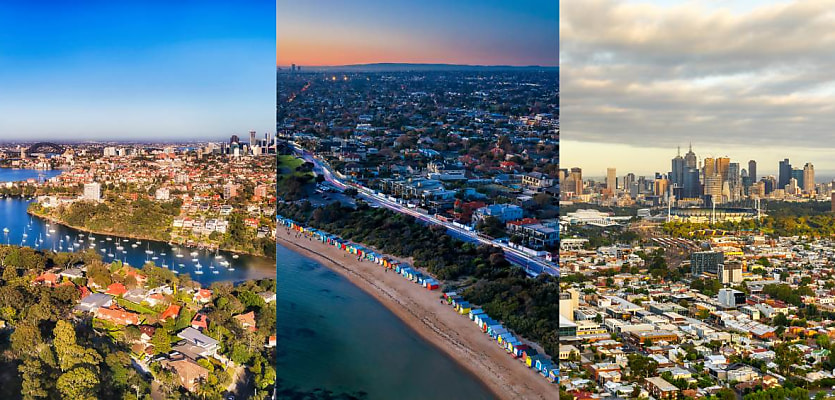While 2022 proved to be a tumultuous year for the property market, a new report revealed that there were a handful of suburbs that managed to cash in 10-digit total sales figures.
PropTrack’s latest data showed the top 10 list of metro suburbs with the highest total sales value last year, with three suburbs recording more than $1 billion worth of sales.
The two biggest cities, Sydney and Melbourne, dominated the list, with the NSW and Victorian capital having five entries, respectively.
Mosman dominated the list, with over $1.65 billion worth of properties changing hands in the harbourside suburb located in Sydney’s lower north shore, throughout the year. It is also the only suburb in NSW to enter the billion-dollar suburb club.
Brighton in Melbourne came in second, with $1.41 billion worth of transactions recorded in the beachside suburb during the period.
The other member of the billion-dollar club from Victoria was Kew, with $1,044,394,803 total sales notched in the high-demand eastern suburb of Melbourne.
Other NSW suburbs to make the top 10 list of the biggest money-making suburbs across metropolitan areas were Castle Hill ($932 million), St Ives ($882 million), Randwick ($869 million), and Manly ($842 million).
Meanwhile, Glen Waverley ($967 million), Mount Waverley ($883 million), and Toorak ($892 million) were the three other Melbourne suburbs to enter the list.
Notably, regional suburbs also performed strongly in terms of sales during the period — with one Queensland suburb notching a total of over $1 billion sales in 2022.
Data showed that Surfers Paradise — where a total sales value of $1.079 billion last year was recorded over the last 12-month period — topped the list of the biggest money-making regional suburbs in 2022.
When ranked across both regional and metropolitan areas, the Golden Coast suburb comes in third place.
With eight entries, the Sunshine State dominated the top 10 list of the money-making suburbs across regional areas.
Other regional Queensland suburbs in the list were Buderim ($761 million), Southport ($675 million), Hope Island ($634 million), Palm Beach ($581 million), Maroochydore ($579 million), Robina ($555 million) and Upper Coomera ($503 million).
NSW was the only other state to have entries in the list, which were the regional suburbs of Port Macquarie ($934 million) and Orange ($506 million).
Rapidly rising rates weighed down on sales activity in 2022, says expert
Overall, data showed that $382 billion worth of home sales were recorded across 400,000 transactions recorded in 2022.
Despite the staggering figures, senior economist at PropTrack Eleanor Creagh highlighted that even top-performing suburbs ended the year with a lower sales total compared to 2021.
“Housing prices slid in the second half of 2022 as buyer activity cooled on the back of rapidly rising interest rates,” she noted.
Data showed that sales volumes nationally were 17 per cent lower over the 2022 calendar year, compared with the previous year.
A closer look at the data showed that while Mosman, Brighton and Kew enjoyed strong sales figures, their total sales were down year on year by 27 per cent, 15 per cent, and 2 per cent, respectively.
Surfers Paradise also saw a 27 per cent annual decline in sales figures, data showed.
The expert explained that the pandemic housing boom has reversed course due to mortgage affordability worsening as interest rates rose at a fast pace.
The Reserve Bank of Australia’s (RBA) monetary policy tightening, which kicked off in May to fight surging inflation, caused the country’s cash rate to reach its highest level in a decade and left the country’s cash rate to stand at 3.10 per cent at the end of 2022 .
Notably, the central bank’s aggressive rate-hiking cycle triggered national home prices to decline through the bulk of the year after peaking in March, with the latest data from PropTrack showing a further 0.21 per cent in December and now sitting at 4.25 per cent below their peak.
Offering her predictions as to what 2023 holds for the property market, Ms Creagh said that home values are likely to continue to fall as the significant reduction in borrowing capacities weighs on prices.
However, she offered that there are silver linings to the gloomy conditions.
“But the downward pressure from rate rises will be countered to a degree by positive demand effects that stem from tight rental markets and associated price pressures, rebounding foreign migration, stronger wages growth, and, over the long run, housing supply pressures.
And if the Reserve Bank hits pause on their tightening cycle in the first half of this year, price falls are likely to ease after that as uncertainty reduces,” she concluded.









You are not authorised to post comments.
Comments will undergo moderation before they get published.